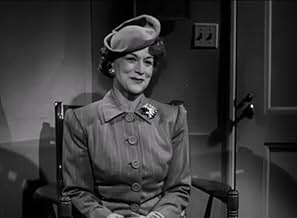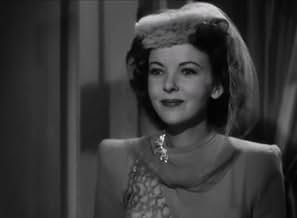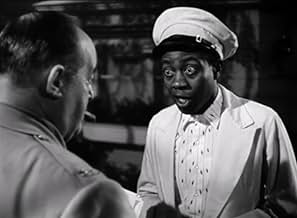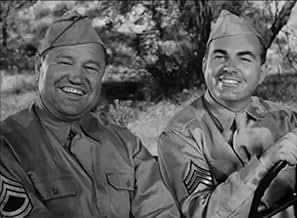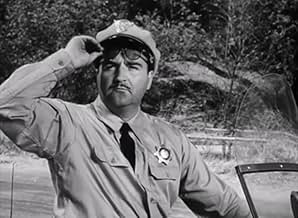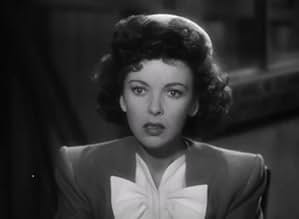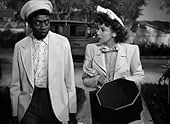A traveling saleswoman convinces an army lieutenant to pose as her husband so that she can rent an apartment during the World War II housing shortage.A traveling saleswoman convinces an army lieutenant to pose as her husband so that she can rent an apartment during the World War II housing shortage.A traveling saleswoman convinces an army lieutenant to pose as her husband so that she can rent an apartment during the World War II housing shortage.
- Director
- Writers
- Stars
- Awards
- 2 wins total
Louis Armstrong
- Louis Armstrong
- (uncredited)
Lynn Baggett
- Disgruntled Traveler
- (uncredited)
Leah Baird
- Sailor's Mother
- (uncredited)
Robert Blake
- Wilbur
- (uncredited)
Eddy Chandler
- Oil Well Foreman
- (uncredited)
Pat Clark
- Sergeant's Girl
- (uncredited)
Joyce Compton
- Gertrude Wilson
- (uncredited)
- Director
- Writers
- All cast & crew
- Production, box office & more at IMDbPro
Featured reviews
This is about the first comedy film that I have ever seen Ida Lupino appear in and she was fantastic. Always knew Ida was multi-talented as an actress, director and producer. In this film Lupino (Jean Howard), "The Devil's Rain",'75, appears as a young gal who wants to work in her father's oil business and decides to become a traveling sales gal, which at the time was unspeakable in that type of business. Jean has to find a proper place to sleep on her travels, and since it was war time, she decided to get hold of a Lt. in the Army who would have living quarters for wives. This lucky Lt. was portrayed by William Prince, (Lt. Don Mallory), "Nuts",'87, who unwillingly helped Jean make this a reality. Another big shock in this film is the appearance of Sydney Greenstreet,(Col. Michael Otley), "Flamingo Road",'49 and of course, the "Maltese Falcon", with Humphrey Bogart. In this role Col. Otley is Don Mallory's Commanding Officer and they live together in the housing unit. It is a very enjoyable funny film and was probably a big shocker for people in 1945, it sure takes a person way back in the PAST.
I enjoyed Ida Lupino in a comedy as much as I ever did in her many dramatic roles;I think her timing is excellent. William Prince is not as skilled, but he makes a good foil for her character in this story.
For its time, the plot was probably considered slightly racy, but was handled so well, you'd never notice. I felt it had just the right touch on an old game, mainly romance, with the added benefit of light comedy that makes it appeal to women and men. The supporting parts were well cast, especially Sydney Greenstreet, who could also do great work in comedy and drama.
I only wish this were available on VHS, or even better, DVD.
For its time, the plot was probably considered slightly racy, but was handled so well, you'd never notice. I felt it had just the right touch on an old game, mainly romance, with the added benefit of light comedy that makes it appeal to women and men. The supporting parts were well cast, especially Sydney Greenstreet, who could also do great work in comedy and drama.
I only wish this were available on VHS, or even better, DVD.
Sweet, silly little trifle is merely an excuse to see Ida Lupino get a chance to put the heavy dramatics aside briefly as a career girl who becomes more pixelated as the complications pile up.
The story addresses the wartime housing shortage and some of the subterfuge that had to be resorted to just to have a decent place to rest your head at times. Of course misunderstandings abound.
Ida is charming and adept at comedy, William Prince is fine but it's a shame that since she rarely did comedy she didn't have a chance to costar with one of the master of the form like Cary Grant or Clark Gable. Sydney Greenstreet is funny as Prince's commanding officer as always relishing a chance to also break from the villain role and play comedy.
All together a cute little ride with nothing important to say but a nice little picture nonetheless.
The story addresses the wartime housing shortage and some of the subterfuge that had to be resorted to just to have a decent place to rest your head at times. Of course misunderstandings abound.
Ida is charming and adept at comedy, William Prince is fine but it's a shame that since she rarely did comedy she didn't have a chance to costar with one of the master of the form like Cary Grant or Clark Gable. Sydney Greenstreet is funny as Prince's commanding officer as always relishing a chance to also break from the villain role and play comedy.
All together a cute little ride with nothing important to say but a nice little picture nonetheless.
Mildly amusing wartime programmer about housing shortage for service couples. Jean (Lupino) finagles an army officer (Prince) to pose as her husband so she can get restricted housing in a motel court. Naturally, "who sleeps where" type complications ensue as they work to keep up appearances. The pace picks up as the difficulties mount, ending finally in madcap farce.
The cast tries hard to make familiar material for the time work. Still, seams do show, especially with Lupino's sometimes over-eager performance. Clearly, she's anxious to show she's as good at comedy as she is at dramatics. Then too, when movie buffs think Greenstreet, comedy doesn't come to mind. But here he plays an unlikely over-weight colonel to pretty good effect. (Note how the script deals with this fudging of army fitness standards.)
The colorful mix of supporting characters includes a mischievous little Robert Blake, a busybody Ruth Donnelly, a bug-eyed Willy Best, and an addled Stuart Erwin. Together, they manage to keep the chuckles coming. The movie, however, doesn't rise to the first rank, perhaps because the elements don't blend into a seamless whole—you can almost see the characters and situations being assembled. Nonetheless, it's a generally entertaining glimpse into what titillated audiences coming out of the big war.
The cast tries hard to make familiar material for the time work. Still, seams do show, especially with Lupino's sometimes over-eager performance. Clearly, she's anxious to show she's as good at comedy as she is at dramatics. Then too, when movie buffs think Greenstreet, comedy doesn't come to mind. But here he plays an unlikely over-weight colonel to pretty good effect. (Note how the script deals with this fudging of army fitness standards.)
The colorful mix of supporting characters includes a mischievous little Robert Blake, a busybody Ruth Donnelly, a bug-eyed Willy Best, and an addled Stuart Erwin. Together, they manage to keep the chuckles coming. The movie, however, doesn't rise to the first rank, perhaps because the elements don't blend into a seamless whole—you can almost see the characters and situations being assembled. Nonetheless, it's a generally entertaining glimpse into what titillated audiences coming out of the big war.
Ida Lupino stars as a saleslady working for her father's company. As it was during WWII, women were assuming many jobs held by men and Ida does this to help out with the war effort. However, she turns out to be pretty bad at sales and by the time she gets to one remote location, she's desperate. But things only get worse, as there is a military base nearby and so there are no spare hotel rooms. On a lark, she checks into a motel designated for spouses of servicemen. However, she's single and lies to get the room--and unless she wants to get tossed out, she'll have to find some guy to pose as her husband. The unsuspecting shmoe is a young lieutenant (William Prince)--whose nice gesture completely blows up in his face. And now, they are stuck together--otherwise the Lieutenant will be in serious trouble with his Colonel. Can all this be straightened out and Lupino and Prince avoid serious consequences?
This is a nice screwy comedy that was pretty timely--as there was a severe housing shorting during the war. In many ways, the theme is reminiscent of the wonderful comedy "The More the Merrier"--though this latter film is much more of a classic. "Pillow to Post", on the other hand, is rather slight...enjoyable but slight.
snafu
This is a nice screwy comedy that was pretty timely--as there was a severe housing shorting during the war. In many ways, the theme is reminiscent of the wonderful comedy "The More the Merrier"--though this latter film is much more of a classic. "Pillow to Post", on the other hand, is rather slight...enjoyable but slight.
snafu
Did you know
- TriviaThis was William Conrad's acting debut.
- GoofsNear the end of the film as Don starts to go after Jean, as the camera tracks him, its moving shadow falls across the back of someone standing in the foreground.
- Quotes
Colonel Michael Otley: Lucille, everyone in the Army isn't a general.
Lucille: No, sir, but you'd be surprised how my tips increased after I started calling everyone general.
- SoundtracksWhatcha Say?
(uncredited)
Music by Burton Lane
Lyrics by Ted Koehler
Performed by Dorothy Dandridge with Louis Armstrong and His Orchestra
[The orchestra performs the song at the Tavern]
Details
- Release date
- Country of origin
- Language
- Also known as
- ¡Qué noche de bodas!
- Filming locations
- Wilshire Boulevard and South Alvarado Street, Los Angeles, California, USA(cab goes through this intersection, driving on Wilshire, at beginning of film)
- Production companies
- See more company credits at IMDbPro
- Runtime
- 1h 32m(92 min)
- Color
- Aspect ratio
- 1.37 : 1
Contribute to this page
Suggest an edit or add missing content

